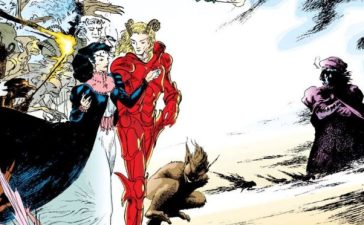
Almost two years after Superman debuted in Action Comics #1, Superman starred in his own radio program, The Adventures of Superman, beginning in February 1940. In the 1940s, television was an expensive, rare luxury, but over 82% of American households owned a radio. The Adventures of Superman was broadcast in fifteen minute episodes, and reached millions of American households; the radio program was listened to by both kids and adults. Given the commercial success of The Adventures of Superman, it is surprising that Batman and Robin – two popular superhero characters also owned by Superman’s publishers – never starred in their own radio program.
However, beginning in 1945, Batman and Robin did appear occasionally as guest characters on The Adventures of Superman. In their first adventure on the radio, Robin asks for Superman’s help in rescuing Batman from a wax museum, where the villainous Zoltan has the hero in a state of suspended animation. In later episodes, Batman and Robin would sometimes have to rescue a missing or incapacitated Superman, and would be the protagonists of the radio program in Superman’s absence. This was supposedly to allow actor Bud Collyer, who played Superman, to take some time off from the radio program. There were various actors who played Batman and Robin on the radio (actor Stacy Harris was the first actor to voice Batman on the radio), but the roles were most often played by actors Matt Crowley and Ronald Liss, respectively.
Below is a recording of the first part of a 1948 The Adventures of Superman story featuring Batman and Robin (also, note the reference at the end of the broadcast to an upcoming radio program starring another superhero, Captain Midnight):
Although Batman and Robin were guests on The Adventures of Superman, the Dynamic Duo never starred in their own radio program. However, two efforts were made to launch a Batman radio drama. In 1943, a pilot radio episode is believed to have been recorded, but the recording has been lost, although the pilot’s script remains. The radio pilot, entitled “The Case of the Drowned Seal”, starred actor Scott Douglas, and explored a variant origin of Robin, whose parents were both acrobats and F.B.I. agents; Robin’s parents were murdered by Nazi spies, which differs from the comic book account of Robin’s parents being murdered by gangsters.
In this pilot, apparently Bruce Wayne, when dressed as Batman, spoke in a British accent to disguise his true identity (hopefully both fans and critics of Christian Bale’s growling Batman voice will find this 1943 solution for Batman’s voice amusing) . Also, the pilot’s opening introduction mentions Batman’s “horned black mask”, which was likely an attempt to link the proposed radio series to the 1943 Batman movie serial.
The pilot failed to generate interest in a ongoing Batman radio program. However, another attempt was made in 1950. The proposed radio program was called The Batman Mystery Club. The narrative structure of this program was Batman – following proper parliamentary procedure – lecturing a kids club about his adventures; these lectures would “prove that ghosts and apparitions are only figments of man’s imagination”. The role of Batman was played by actor John Emery, and the pilot episode, entitled “The Monster of Dumphrey’s Hall”, did not generate interest in an ongoing radio program. Putting aside the strange format of the pilot episode, The Batman Mystery Club would still have been a hard sell; by 1950, television had become a major competitor of radio programming, and even the popular The Adventures of Superman radio program was canceled in 1951.
Below is a recording of the pilot episode of The Batman Mystery Club:
It’s too bad that we will never know the solution to the mystery presented in “The Monster of Dumphrey’s Hall”, although we can be sure that ghosts and apparitions were not involved. It’s also too bad that Batman never got a chance to star in his own radio program. Given the character’s popularity in other media, Batman could have been a star of the radio.








